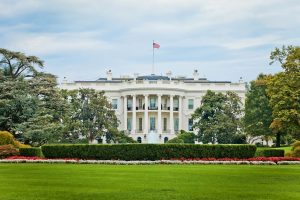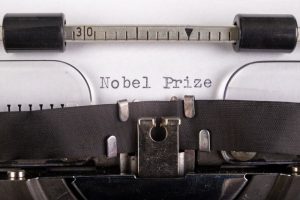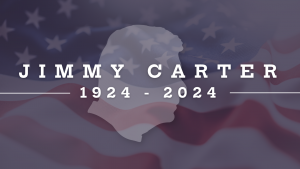“The bond of our common humanity is stronger than the divisiveness of our fears and prejudices.” – Jimmy Carter
As we mark James “Jimmy” Earl Carter Jr.’s passing, we cannot help but reflect on his life and the legacy he leaves behind – a life characterized by his devotion to creating a better America.
In fact, in 2002, The Norwegian Nobel Committee awarded Carter the Nobel Peace Prize “for his decades of untiring effort to find peaceful solutions to international conflicts, to advance democracy and human rights, and to promote economic and social development.” He is one of only four presidents to receive the Nobel Peace Prize, and the only one to receive it after leaving office.
Biography
Before his presidency
Born on October 1, 1924, in Plains, Georgia, Carter was the eldest son of Bessie Lillian and James Earl Carter Sr. In his rural hometown, peanut farming, politics, and the Baptist faith were constants throughout Carter’s growing-up years. After high school, he went on to attend the Naval Academy in Annapolis, Maryland, graduating in 1946. That same year, Carter married Rosalynn Smith, and together, they had four children: Jack, Chip, Jeff, and Amy Lynn.
After seven years of service as a naval officer and the death of his father, Carter returned to Plains and ran the family farm before becoming involved in state politics in 1962. A few short years later, in 1970, he was elected Governor of Georgia and announced his run for president in 1974. Then, in November 1976, he won the presidential race against Gerald Ford (securing 297 electoral votes to Ford’s 241).
 (Jimmy Carter grew up on a peanut farm in rural Plains, Georgia)
(Jimmy Carter grew up on a peanut farm in rural Plains, Georgia)
During his presidency
As with any presidency, there were many ups and downs, but he made advances in domestic affairs, including establishing national energy regulation policies, expanding the national park system, creating the Department of Education, and bolstering the Social Security system.
In foreign affairs, he helped bring amity between Egypt and Israel with the Camp David Accords, established full diplomatic relations with China, and completed a nuclear limitation treaty with the Soviet Union (now Russia).
However, a major setback occurred in the last 14 months of his presidency: The Iranian Hostage Crisis. Iranian militants stormed the U.S. Embassy in Tehran and held 66 Americans hostage, some for 444 days. This event, along with continuing inflation at home, led to Carter’s losing the presidency in 1980.

(Carter spent four years as president of the United States and lived in the White House)
After his presidency
Following his time as president, Carter devoted his time to becoming a champion for human rights. He opened the Carter Center in 1982, which focuses on issues relating to democracy and human rights. Through the Center, he played a key role in mediating disputes between the U.S. State Department and volatile foreign leaders, such as Kim Il Sung of North Korea and Muammar Qaddaffi of Libya. It was this post-presidency work that led to his receiving the Nobel Peace Prize.
Major Life Accomplishments
- Served as the 39th President of the United States (1977-1981)
- Awarded the Nobel Peace Prize in 2002
- Authored 23 books, including Keeping Faith: Memoirs of a President (1983), Turning Point (1992), and An Hour Before Daylight (2001)
- Became University Distinguished Professor at Emory University and opened The Carter Center
The Importance of a Legacy
As we look back at Carter’s life, none of us can deny that he leaves a legacy. But a legacy is not only for prominent people. Every single one of us leaves a legacy of some kind. It’s up to us whether that legacy is good, bad, or somewhere in between.
“Carve your name on hearts, not tombstones. A legacy is etched into the minds of others and the stories they share about you.” — Shannon L. Alder
Look at your own life and determine what kind of legacy you want to leave. And then, ask yourself, “Does my life reflect the legacy I want it to?” If it doesn’t, start thinking about the big and small things you can change in your life to build the legacy you want.
Reflect on those who left a legacy for you
Every person is affected by the generations that came before, whether they want to be or not. It’s apparent in Carter’s life that his upbringing left a lasting legacy. So, think about your parents, grandparents, aunts, uncles, schoolteachers, coaches, neighbors, friends, and even people throughout history or in public service who have had an impact on the way you view yourself and the world. Each of these people left a legacy with you – some good, some bad. Now, think about the legacy you’ve built so far with those around you. Are you happy with it? Or are there some things you’d like to change?

(Carter received the Nobel Peace Prize for his dedication to conflict resolution, human rights, and social development)
Realize that leaving a legacy is not a choice
Whether you want to or not, you will leave a legacy because the people around you will remember you a certain way, depending on how you handled yourself and treated others. It’s up to you whether you have an accidental legacy or an intentional one. While Carter may or may not have initially set out to create a legacy, he did nonetheless. There’s nothing you can do to prevent people from forming an opinion of you, but you can contribute to whether that opinion – your legacy with that person – teaches them how to live well and love others or not.
Remember that quality time spent with others is the most important
When you involve yourself in the lives of others, you have an impact on their lives. Just as Carter had a profound impact on his wife, his children, and countless others, so can you. As the saying goes, when we near the end of our lives, we don’t wish we had worked more; we wish we had lived more. That includes spending time with the most important people in our lives. As you seek to leave a legacy:
- Look for opportunities to know others and be known by them
- Model and teach what’s most important
- Compliment, encourage, and build up your family, children, and grandchildren
- Share the wisdom that you have gained in your life and pass along the knowledge
With our legacies, we contribute to the future. What we do and say affects the lives of others and has the power to create good or bad. What we do matters. Most of us are not prominent people whose names are known by thousands, but that doesn’t ultimately matter. Instead, it is our responsibility as good men and women to create legacies that will take our families and the next generation to a level we can only imagine.
Let’s be intentional about the impact we have on others and create legacies worth remembering.
To learn more about how to build a legacy, make sure to read How to Leave a Meaningful Legacy.





